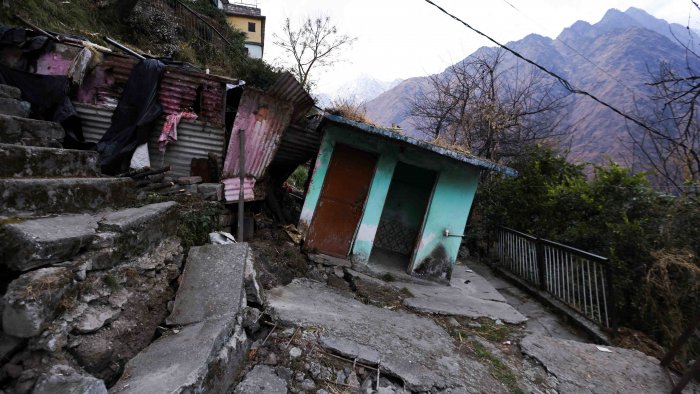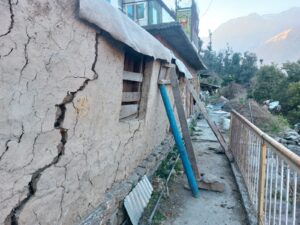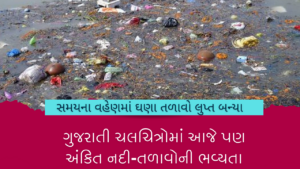Joshimath, the sacred gateway to pilgrimage and housing more than 25000, breaks down one fine morning. More than 68 families were evacuated, 700 homes declared unsafe and people’s pleas gone unheard.
Several experts have tried to unpack what actually went wrong with the sinking hill town of Uttarakhand. Residents of Joshimath, in Uttarakhand’s Chamoli district have been evacuating their homes to seek safety due to the issue of land subsidence in the region. Cracks had begun appearing on houses in the city due to the vertical sinking of land in the area. Around nine wards of Joshimath are massively affected by landslides as deep cracks have begun appearing on walls. More than 3000 residents from 576 homes suffered the effects of land subsidence as all houses were surveyed by the municipality and people were forced to evacuate.
In this ordeal, more than 70 houses developed cracks in the last 10 days with cracks appearing on the surfaces of government schools and National Highway. The residents of Joshimath state that they are practically living on a ticking time bomb. They are currently questioning the future of the city. Several allege that the most contributing factor to the landslide was a 12 km long tunnel by the NTPC Tapovan Vishnugad Hydropower Project. NTPC officials have however refuted the allegation by single media persons of the tunnel and clarified that the land sinking was not caused by their project. A team of experts conducted a survey of the town where they found the sinking had started way before as cracks had begun appearing on the surfaces of a number of houses.
The citizens of Joshimath had planned to meet Uttarakhand Chief Minister Pushkar Singh Dhami to request assistance for those affected by the land subsidence. The CM sought a detailed report from Chamoli District Magistrate (DM) on the situation. On the basis of reports, the CM instructed officials to provide all the required relief to those affected , including traders who have supposedly suffered severe losses. The matter has been declared “gravely serious” by the CM.
There are several reasons that led to this tragic incident, such as the cold wave across North India, particularly affecting hill stations, negligence of the city administration, poor disaster management policies and many more.
Experts have come up with a set of reasons that have contributed to the land subsidence:
- The town’s geographical location
- Joshimath is built on landslide debris and has a low bearing capacity
- Slopes have been unstable since the last decade due to reasons such as various hydropower projects and the extension of the National Highway
- According to a 2022 survey by the Wadia Institute of Himalayan Geology, Gneissic rocks were found to be extremely worn with poor cohesive value and of high pore pressure when saturated with water.
- Allegations were made by the citizens of Joshimath against NTPC (National Thermal Power Corporation) And against the government for turning a blind eye against NTPC’s injustice.
- Joshimath Bachao Sangharsh Samiti’s leader stated that NTPC had confessed to witnessing water seepage from a punctured aquifer in their tunnel which led to the drying of water sourced in 2020. A renowned Environmentalist stated that the punctured aquifer located inside Joshimath’s mountainous areas acted like a leaking button.
- NTPC refuted all these allegations.
Is there a way to revive Joshimath?
A question that looms in the minds of most, maybe some; can Joshimath be revived? A few experts who have studied the matter in depth, such as the Secretary of Disaster Management along with a team that was dispatched by the government were tasked with investigating the matter thoroughly and providing the Centre with a report. According to these experts and their recommendation, the construction of all hydroelectric projects must be halted immediately. All residents must first be taken to a safe area after which town planning must be revised to account for new variables and shifting geographical conditions. Drainage planning must be developed and requires in-depth investigation, as garbage seeps into the soil and loosens it from the inside. The city therefore suffers from poor drainage and sewer management. The state management must urge the irrigation department to check and survey the situation. To preserve soil capacity in the area, experts have recommended replanting at sensitive sites. Finally, the most important factor of all is the coordinated efforts between the center and the state to help bring about a solution to the issue.














